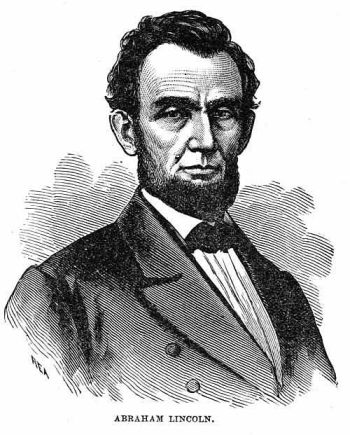 Virginia’s secession convention convenes in Richmond. At this point, there is no certainty that Virginia will secede from the Union, as Union sentiment is yet strong throughout much of the state. Yet many white Virginians and other white southerners, certain that Lincoln’s goal as president is to grant freedom to black slaves, are preparing to take up arms should the incoming president exhibit hostile advances toward the Confederate States of America.
Virginia’s secession convention convenes in Richmond. At this point, there is no certainty that Virginia will secede from the Union, as Union sentiment is yet strong throughout much of the state. Yet many white Virginians and other white southerners, certain that Lincoln’s goal as president is to grant freedom to black slaves, are preparing to take up arms should the incoming president exhibit hostile advances toward the Confederate States of America.
The object of southern white scorn, Lincoln, a former Primitive Baptist but now more reticent regarding faith matters, travels from Cincinnati to Columbus, Ohio on his journey to the White House. As Lincoln journeys, a peace conference at the Willard Hotel in Washington, D. C. is proving fruitless. The North and South are growing further apart, with the border states caught in the middle.
In the afternoon, Lincoln addresses the Ohio Legislature in Columbus, and references God twice in a short speech:
“MR. PRESIDENT AND MR. SPEAKER AND GENTLEMEN OF THE GENERAL ASSEMBLY:—It is true, as has been said by the President of the Senate, that very great responsibility rests upon me in the position to which the votes of the American people have called me. I am deeply sensible of that weighty responsibility. I cannot but know what you all know, that, without a name, perhaps without a reason why I should have a name, there has fallen upon me a task such as did not rest even upon the Father of his country, and so feeling I cannot but turn and look for the support without which it will be impossible for me to perform that great task. I turn, then, and look to the American people and to that God who has never forsaken them. Allusion has been made to the interest felt in relation to the policy of the new administration. In this I have received from some a degree of credit for having kept silence, and from others some deprecation. I still think that I was right. In the varying and repeatedly shifting scenes of the present, and without a precedent which could enable me to judge by the past, it has seemed fitting that before speaking upon the difficulties of the country, I should have gained a view of the whole field, to be sure, after all, being at liberty to modify and change the course of policy, as future events may make a change necessary. I have not maintained silence from any want of real anxiety. It is a good thing that there is no more than anxiety, for there is nothing going wrong. It is a consoling circumstance that when we look out there is nothing that really hurts anybody. We entertain different views upon political questions, but nobody is suffering anything. This is a most consoling circumstance, and from it we may conclude that all we want is time, patience and a reliance on that God who has never forsaken this people. Fellow citizens, what I have said, I have said altogether extemporaneously, and I will now come to a close.”
Following the speech, Lincoln receives word that his election as president of the United States has been confirmed by electoral college voting.


